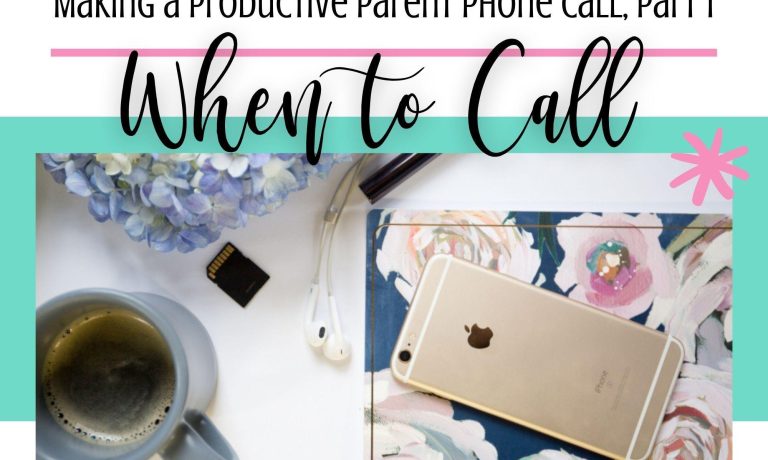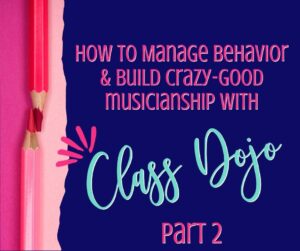This blog is the first in a series about making parent phone calls. Why? Because they’re scary– but they don’t have to be. In this first session, we’ll talk about when to call & when not to call parents.
In the next section, we’ll address the positive parent phone calls you can make and the specific language you can use to get parents on your side.
Let’s jump in!
Does this sound like you– you’re a new teacher, and you’re killing it learning ALL the things. Your program is getting off the ground, and you’re really enjoying this new time as a music teacher. There’s just this one tiny thing…
You haven’t made a parent phone call yet. Yeah, yeah, you’ll get to it. There are more pressing matters, aren’t there? It’s not a big deal.
I’ve been right there. It wasn’t until December of my first year teaching that I actually called my first parent. I had let this behavior situation get completely out of hand and knew it had come to this. I told myself that it was because I wanted my students to view me as the person in charge, but REALLY it was because I had the same fear you do–
I didn’t want to get yelled at.
We’ve all heard horror stories of parents yelling at teachers, berating them for disrupting their day, or cursing at them and calling them names because they’re feeling insulted or their child claims you pick on them. And it’s true, sometimes parents forget they’re talking to a human being with feelings, but even if a parent DOES fly off the handle with you (this is rare!), I’ll help you know what to do.
In this article, we’ll talk about the importance of building relationships via your parent phone call, what sorts of issues you don’t need to bother parents with (aka what should you handle on your own), what do parents NEED to know about, specific language that works when talking to parents, and what exactly to do during a parent phone call that gets out of hand (aka. abusive). You’re not supposed to “figure it out on your own.”

Parent Phone Calls- Building Relationships
Your parents are some of your biggest allies when it comes to running a great music program. You’re going to need their help if you ever want to:
- Run a fundraiser
- Take your students on a trip
- Brainstorm how to help a struggling student
- Celebrate a student’s success
- Get sponsorships
- Run out-of-school hours rehearsals
- Rent instruments
- and so many other things!
Think about it– as music teachers, we know our students for entire giant chunks of their childhood/young adulthood. Parents must know us as their allies. Parent phone calls are the single best way to boost that confidence. They need to hear our voices, our tone, and that bridge must be built because there WILL inevitably come a time where we see them at a concert, out in the community, or our school. It’s a great opportunity to greet them by name and build that relationship because it strengthens those future connection opportunities.

What Situations Do Not Require a Parent Phone Call
First off, let’s tackle the things that don’t require parent intervention. There are plenty of times in your classroom that you might think, ‘Should I call a parent about this?’ and in general, these are some things that I’ve realized don’t warrant a parent phone call.
- Missing Materials
- Did your student forget their homework? Maybe they claimed their instrument is at home. In general, this situation requires some brainstorming with the student. Help them set a plan, reminders on their phone, or a colored ribbon bracelet reminder. Help them claim authority over this situation first. If it becomes a pattern (the student needs more parent help), then call home.
- In general, try to get to the bottom of why this is happening. Is the student ashamed of their playing? If so, they may claim their instrument is at home because someone around them is teasing them. Maybe they forgot to prepare for a playing test or didn’t understand an assignment. Maybe they’re in charge of younger brothers and sisters at home and didn’t get a chance to prepare. Maybe they live in an apartment that doesn’t allow playing loud music, and they’re embarrassed.
There are often deeper reasons why students start forgetting their supplies that stem beyond typical forgetfulness (though that often is simply the case).
- Minor Misbehavior/Cell Phone Use/ Sneaking Food into the Classroom/Tardiness etc.
- A student talked back to you. You caught them on their phone. They whipped out some Takis and shared them with the Alto section. There are TONS of times when students test boundaries in our classrooms. This situation becomes a simple classroom management issue. Your job as the teacher is to develop rules in your room and a discipline plan (often, schools have plans that all teachers follow). When students break a rule, follow your plan.
You’re probably asking yourself, “When do I know if it’s a bigger issue, though? I know I should think about contacting parents, but where’s the line?” And here’s the simple answer, you’re looking for a pattern of behavior. Students break the rules all of the time. Maybe they’re having a bad day, maybe they’re tired or stressed or simply hungry.
The point at which you contact parents in these types of situations are where: the student knows the rules, the student knows the discipline policy, the student breaks the rule, the teacher follows discipline policy, student breaks the same rule again. Students make errors in judgment, but when it becomes a pattern, parents are called because it starts to become defiance and indicative of a deeper issue.
Don’t forget, your admin are your allies in these types of situations. They can advise you on how to follow a classroom management plan. Talk to other music teachers in your district or online. There’s a reason why classroom management is such a big-ticket topic– everyone has their own ideas. The cool part is, in your classroom, you get to decide what works for you. For a fun take on some of my classroom management thoughts, click here!
- A student talked back to you. You caught them on their phone. They whipped out some Takis and shared them with the Alto section. There are TONS of times when students test boundaries in our classrooms. This situation becomes a simple classroom management issue. Your job as the teacher is to develop rules in your room and a discipline plan (often, schools have plans that all teachers follow). When students break a rule, follow your plan.

What Situations Require a Parent Phone Call Immediately (By the End of the Day)?
You’re going to encounter less frequent times when a parent needs to be notified about an issue right away. This type of parent phone call should only be used when more major issues need addressing. I know that it’s scary to consider some of these issues, but it’s a good idea to think of them now just in case you need to reference them later. Here are some issues that require an immediate/near-immediate (by the end of the day) parent phone call:
- Medical Emergencies/Injuries That Occur In Your Classroom
- Your admin will have a protocol to follow for these situations when making a parent phone call. Sometimes you must contact the parent; sometimes, the admin/nurse will contact them on your behalf. If you are required to call the parent, make sure you call with a member of your admin team. Explain the accident, what (if any) rules were broken by the student that led to this situation, and what you are doing to ensure this doesn’t happen again. The long and short of it is that these types of things happen, and it is rarely directly your fault.
I once had a heavy electric keyboard propped up against my back classroom wall (it wasn’t being used). A student lying down in the back working on a group project accidentally knocked it over with his foot, and it gave him a nasty gash in his head. I felt awful, shed many tears that day, and the poor guy had to get stitches. But as teachers, we can only prepare for so many things. All you can do is learn from these situations and make sure that you adjust so that it doesn’t happen again.
If a student has seizures, food allergies, asthma, etc., make sure you receive proper training. If you have any questions, contact your school nurse or admin team for guidance on whether you need to make a parent phone call in these situations.
- Your admin will have a protocol to follow for these situations when making a parent phone call. Sometimes you must contact the parent; sometimes, the admin/nurse will contact them on your behalf. If you are required to call the parent, make sure you call with a member of your admin team. Explain the accident, what (if any) rules were broken by the student that led to this situation, and what you are doing to ensure this doesn’t happen again. The long and short of it is that these types of things happen, and it is rarely directly your fault.

- Major Defiance/ Disrespect/ Major Issues
Let’s talk about disrespect and other major issues. There’s an entire spectrum of things that will occur in your classroom. Sometimes you can handle it on your own, and sometimes you can’t. Here are some of the more emergent situations that require a parent phone call:
- Blatant Bullying: did a student call another student a sexist/racist/homophobic etc., name? Did you witness a child pull out a chair from another student or trip/shove/hit another student intentionally? Did a student call you a name or curse at you, or yell at another student? Any of these situations require immediate intervention with the help of your admin and a parent phone call.
- Injuries/Self-Harm: Have you witnessed cutting lines on a student’s arms? Did you overhear them talking about doing drugs or reference suicide? Did they come to class with a black eye? Immediately contact your admin and counseling team. You may need to make a child abuse report. Inquire whether a parent needs to be notified; sometimes, you are NOT the person to make contact in this situation.
- Ditching: by federal law, students are required to be in class. If they are not, this is a major issue that must be addressed early. Focus on building bridges with parents and the student. Work on making your classroom a safe place to be. Work with parents/students/counseling to determine if there is another issue– does the student have ADHD and really struggle with sitting in class? Do they get overwhelmed with the loud noises of your classroom environment?
Beyond repairing relationships and teaching required knowledge, you are responsible for legally knowing where students are when they are in your class during an appointed time in case of an emergency. If there is an emergency and a student is ditching your class, that is a major issue. Avoid this by involving the admin immediately and making a parent phone call.
- Failing Grades After Repeated Intervention From You: Are you several months into school and a student has a failing grade because they aren’t completing their makeup playing/singing tests? Are they flaking out about coming in for extra help? Have you attempted accommodations, and the student refuses to do them? Now’s the time to contact parents. Please do NOT wait for the report card to tell them that their student is failing your class.
- Student Requesting to Drop Music: Ugh. I hate this one because I still take it so personally when a student tells me they want to quit my class. But, in more cases than not, the parent already knows about this and can give more information about the true reasons why the student wants to quit.
I once had one of my top students come back from summer vacation and request to drop choir during the first week of school. I called home and talked to her mom. Apparently, there was a falling-out with her and her best friend, who sat right behind her in class. She didn’t want to tell me because she didn’t want to “snitch” on the other girl. I made a quick seating-chart adjustment for the entire class (I told them I wanted to try some voices in different places), and no one knew why. She was much happier, and I kept her in choir class. But if I hadn’t reached out to her mom, I never would have known.
- Sudden Major Change in Behavior/Withdrawal: this is one of the single most important roles you have as a teacher– being the first line of defense against abuse and self-harm. Sometimes, student injuries aren’t obvious. Maybe they’re requesting not to do warm-up stretches; your sweetest student can’t stop crying, a student you have a great relationship with just called you a horrible name, a student can’t seem to stay awake in your class, you smell drugs or alcohol on their breath, etc.
You are often the eyes and ears of the parent during large parts of their child’s day. You are not responsible for solving issues. As much as we wish we could, we can’t prevent abuse, we can’t stop parents from fighting and keeping students awake at night, we can’t stop them from doing drugs or alcohol, we can’t stop them from hurting. But, we can follow our status as a mandatory reporter and refer the situation to people who CAN help. Sometimes that means contacting a parent. Sometimes that means contacting authorities.
Occasionally, if the abuse is suspected by the parent, you do NOT make a parent phone call. However, in most major changes in behavior, a parent wants and needs to know that their student is struggling. In this case, get more input from your leadership if you aren’t sure about what to do. If you live in the USA, here’s a link with state-by-state information about mandatory reporting. Please read up on this, chat with your admin and counseling team, and know the laws of your state/district when it comes to mandatory reporting.
There is so much to cover when making parent phone calls—most of which I didn’t truly understand for years. In the next session, we’ll talk more about the specific scripts I’ve used and how to make all of the many positive phone calls you can! In the meantime, here’s an awesome blog with some possible scripts to get you going.
Did I miss any great tips? What are you struggling with when it comes to parent phone calls? Leave a comment.





